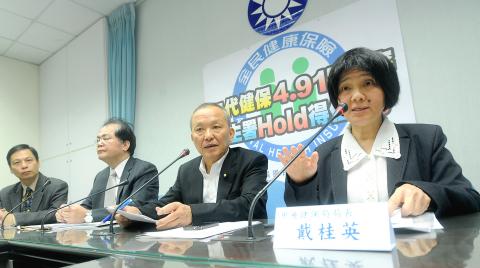Taiwanese have found it difficult to guard their wallets after President Ma Ying-jeou’s (馬英九) re-election, because almost everything has become more expensive, Democratic Progressive Party (DPP) lawmakers said yesterday.
“From gasoline to LPG [liquefied petroleum gas] to natural gas, and from fertilizer to tuition and health insurance ... you name it. The prices for all these things went up after Ma was re-elected,” DPP Legislator Pan Men-an (潘孟安) told a press conference.
It is ironic that the Cabinet, led by Premier Sean Chen (陳冲), calls itself a “Cabinet of relief,” which is supposed to strengthen the economy and enrich the people, he said.

Photo: Lin Cheng-kung, Taipei Times
Ma and former health minister Yaung Chih-liang (楊志良) had pledged that the fixed premium rate of 4.91 percent would be kept unchanged at least during the first five years of the second-generation National Health Insurance program, which is scheduled to come into effect in July, Pan said.
However, there are reports that the Department of Health is planning to adopt a higher rate, which would be a betrayal of Ma’s pledge, he said.
The DPP caucus urged the government to stay true to its promise by keeping the rate unchanged and revising regulations to make premium fees proportional to incomes, he said.
DPP Legislator Chen Ting-fei (陳亭妃) said the department had pledged that the health insurance premium would not increase for at least 80 percent of the total insured population under the new system.
Healthcare spending is not the only thing people are worried about, she said, adding that the Ministry of Education is mulling an increase in college tuition next month and the Ministry of Economic Affairs is considering raising gasoline and electricity prices.
The Executive Yuan’s citing of “market mechanisms” as the reason behind the hike is a “Taipei-centric perspective,” which ignores the well-being of families with lower incomes, retired economics professor Kenneth Lin (林向愷) told a separate press conference.
The government also ignored the role of Taiwan Power Co and CPC Corp, Taiwan, both of which are state-controlled companies, Lin said.
“It would be difficult to accept the price increase with the opaque operations of these two companies,” he said.
Lin ridiculed the government theory that mild inflation would benefit Taiwan’s economy, saying that if Ma does not tackle the price increases, public anger would drag his approval ratings to a new low.

Taiwanese can file complaints with the Tourism Administration to report travel agencies if their activities caused termination of a person’s citizenship, Mainland Affairs Council Minister Chiu Chui-cheng (邱垂正) said yesterday, after a podcaster highlighted a case in which a person’s citizenship was canceled for receiving a single-use Chinese passport to enter Russia. The council is aware of incidents in which people who signed up through Chinese travel agencies for tours of Russia were told they could obtain Russian visas and fast-track border clearance, Chiu told reporters on the sidelines of an event in Taipei. However, the travel agencies actually applied

Japanese footwear brand Onitsuka Tiger today issued a public apology and said it has suspended an employee amid allegations that the staff member discriminated against a Vietnamese customer at its Taipei 101 store. Posting on the social media platform Threads yesterday, a user said that an employee at the store said that “those shoes are very expensive” when her friend, who is a migrant worker from Vietnam, asked for assistance. The employee then ignored her until she asked again, to which she replied: "We don't have a size 37." The post had amassed nearly 26,000 likes and 916 comments as of this

New measures aimed at making Taiwan more attractive to foreign professionals came into effect this month, the National Development Council said yesterday. Among the changes, international students at Taiwanese universities would be able to work in Taiwan without a work permit in the two years after they graduate, explainer materials provided by the council said. In addition, foreign nationals who graduated from one of the world’s top 200 universities within the past five years can also apply for a two-year open work permit. Previously, those graduates would have needed to apply for a work permit using point-based criteria or have a Taiwanese company

The Shilin District Prosecutors’ Office yesterday indicted two Taiwanese and issued a wanted notice for Pete Liu (劉作虎), founder of Shenzhen-based smartphone manufacturer OnePlus Technology Co (萬普拉斯科技), for allegedly contravening the Act Governing Relations Between the People of the Taiwan Area and the Mainland Area (臺灣地區與大陸地區人民關係條例) by poaching 70 engineers in Taiwan. Liu allegedly traveled to Taiwan at the end of 2014 and met with a Taiwanese man surnamed Lin (林) to discuss establishing a mobile software research and development (R&D) team in Taiwan, prosecutors said. Without approval from the government, Lin, following Liu’s instructions, recruited more than 70 software